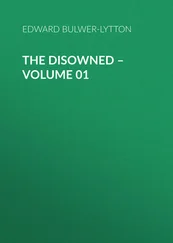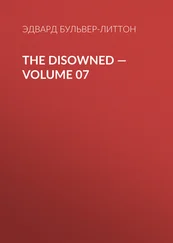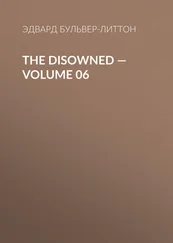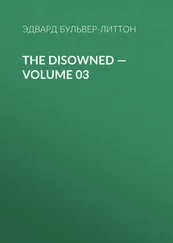Эдвард Бульвер-Литтон - The Disowned — Complete
Здесь есть возможность читать онлайн «Эдвард Бульвер-Литтон - The Disowned — Complete» — ознакомительный отрывок электронной книги совершенно бесплатно, а после прочтения отрывка купить полную версию. В некоторых случаях можно слушать аудио, скачать через торрент в формате fb2 и присутствует краткое содержание. Жанр: foreign_prose, literature_19, Европейская старинная литература, foreign_antique, на английском языке. Описание произведения, (предисловие) а так же отзывы посетителей доступны на портале библиотеки ЛибКат.
- Название:The Disowned — Complete
- Автор:
- Жанр:
- Год:неизвестен
- ISBN:нет данных
- Рейтинг книги:5 / 5. Голосов: 1
-
Избранное:Добавить в избранное
- Отзывы:
-
Ваша оценка:
- 100
- 1
- 2
- 3
- 4
- 5
The Disowned — Complete: краткое содержание, описание и аннотация
Предлагаем к чтению аннотацию, описание, краткое содержание или предисловие (зависит от того, что написал сам автор книги «The Disowned — Complete»). Если вы не нашли необходимую информацию о книге — напишите в комментариях, мы постараемся отыскать её.
The Disowned — Complete — читать онлайн ознакомительный отрывок
Ниже представлен текст книги, разбитый по страницам. Система сохранения места последней прочитанной страницы, позволяет с удобством читать онлайн бесплатно книгу «The Disowned — Complete», без необходимости каждый раз заново искать на чём Вы остановились. Поставьте закладку, и сможете в любой момент перейти на страницу, на которой закончили чтение.
Интервал:
Закладка:
“Lord, Mr. Copperas,” said his helpmate, “how can you be so silly? setting such an example to your son, too; never mind him, Adolphus, my love; fie, child! a’n’t you ashamed of yourself? never put the spoon in your cup till you have done tea: I must really send you to school to learn manners. We have a very pretty little collection of books here, Mr. Linden, if you would like to read an hour or two after breakfast,—child, take your hands out of your pockets,—all the best English classics I believe,—‘Telemachus,’ and Young’s ‘Night Thoughts,’ and ‘Joseph Andrews,’ and the ‘Spectator,’ and Pope’s Iliad, and Creech’s Lucretius; but you will look over them yourself! This is Liberty Hall, as well as Copperas Bower, Mr. Linden!”
“Well, my love,” said the stock-jobber, “I believe I must be off. Here Tom,” Tom (Mr. de Warens had just entered the room with some more hot water, to weaken still further “the poor remains of what was once”—the tea!), “Tom, just run out and stop the coach; it will be by in five minutes.”
“Have not I prayed and besought you, many and many a time, Mr. Copperas,” said the lady, rebukingly, “not to call De Warens by his Christian name? Don’t you know that all people in genteel life, who only keep one servant, invariably call him by his surname, as if he were the butler, you know?”
“Now, that is too good, my love,” said Copperas. “I will call poor Tom by any surname you please, but I really can’t pass him off for a butler! Ha—ha—ha—you must excuse me there, my love!”
“And pray, why not, Mr. Copperas? I have known many a butler bungle more at a cork than he does; and pray tell me who did you ever see wait better at dinner?”
“He wait at dinner, my love! it is not he who waits.”
“Who then, Mr. Copperas?”
“Why we, my love; it’s we who wait for dinner; but that’s the cook’s fault, not his.”
“Pshaw! Mr. Copperas; Adolphus, my love, sit upright, darling.”
Here De Warens cried from the bottom of the stairs,—“Measter, the coach be coming up.”
“There won’t be room for it to turn then,” said the facetious Mr. Copperas, looking round the apartment as if he took the words literally.
“What coach is it, boy?”
Now that was not the age in which coaches scoured the city every half hour, and Mr. Copperas knew the name of the coach as well as he knew his own.
“It be the Swallow coach, sir.”
“Oh, very well: then since I have swallowed in the roll, I will now roll in the Swallow—ha—ha—ha! Good-by, Mr. Linden.”
No sooner had the witty stock-jobber left the room than Mrs. Copperas seemed to expand into a new existence. “My husband, sir,” said she, apologetically, “is so odd, but he’s an excellent sterling character; and that, you know, Mr. Linden, tells more in the bosom of a family than all the shining qualities which captivate the imagination. I am sure, Mr. Linden, that the moralist is right in admonishing us to prefer the gold to the tinsel. I have now been married some years, and every year seems happier than the last; but then, Mr. Linden, it is such a pleasure to contemplate the growing graces of the sweet pledge of our mutual love.—Adolphus, my dear, keep your feet still, and take your hands out of your pockets!”
A short pause ensued.
“We see a great deal of company,” said Mrs. Copperas, pompously, “and of the very best description. Sometimes we are favoured by the society of the great Mr. Talbot, a gentleman of immense fortune and quite the courtier: he is, it is true, a little eccentric in his dress: but then he was a celebrated beau in his young days. He is our next neighbour; you can see his house out of the window, just across the garden—there! We have also, sometimes, our humble board graced by a very elegant friend of mine, Miss Barbara York, a lady of very high connections, her first cousin was a lord mayor.—Adolphus, my dear, what are you about? Well, Mr. Linden, you will find your retreat quite undisturbed; I must go about the household affairs; not that I do anything more than superintend, you know, sir; but I think no lady should be above consulting her husband’s interests; that’s what I call true old English conjugal affection. Come, Adolphus, my dear.”
And Clarence was now alone. “I fear,” thought he, “that I shall get on very indifferently with these people. But it will not do for me to be misanthropical, and (as Dr. Latinas was wont to say) the great merit of philosophy, when we cannot command circumstances, is to reconcile us to them.”
CHAPTER XII
A retired beau is one of the most instructive spectacles in the world.
STEPHEN MONTAGUE.It was quite true that Mrs. Copperas saw a great deal of company, for at a certain charge, upon certain days, any individual might have the honour of sharing her family repast; and many, of various callings, though chiefly in commercial life, met at her miscellaneous board. Clarence must, indeed, have been difficult to please, or obtuse of observation, if, in the variety of her guests, he had not found something either to interest or amuse him. Heavens! what a motley group were accustomed, twice in the week, to assemble there! the little dining-parlour seemed a human oven; and it must be owned that Clarence was no slight magnet of attraction to the female part of the guests. Mrs. Copperas’s bosom friend in especial, the accomplished Miss Barbara York, darted the most tender glances on the handsome young stranger; but whether or not a nose remarkably prominent and long prevented the glances from taking full effect, it is certain that Clarence seldom repaid them with that affectionate ardour which Miss Barbara York had ventured to anticipate. The only persons indeed for whom he felt any sympathetic attraction were of the same sex as himself. The one was Mr. Talbot, the old gentleman whom Mrs. Copperas had described as the perfect courtier; the other, a young artist of the name of Warner. Talbot, to Clarence’s great astonishment (for Mrs. Copperas’s eulogy had prepared him for something eminently displeasing) was a man of birth, fortune, and manners peculiarly graceful and attractive. It is true, however, that, despite of his vicinity, and Mrs. Copperas’s urgent solicitations, he very seldom honoured her with his company, and he always cautiously sent over his servant in the morning to inquire the names and number of her expected guests; nor was he ever known to share the plenteous board of the stock-jobber’s lady whenever any other partaker of its dainties save Clarence and the young artist were present. The latter, the old gentleman really liked; and as for one truly well born and well bred there is no vulgarity except in the mind, the slender means, obscure birth, and struggling profession of Warner were circumstances which, as they increased the merit of a gentle manner and a fine mind, spoke rather in his favour than the reverse. Mr. Talbot was greatly struck by Clarence Linden’s conversation and appearance; and indeed there was in Talbot’s tastes so strong a bias to aristocratic externals that Clarence’s air alone would have been sufficient to win the good graces of a man who had, perhaps, more than most courtiers of his time, cultivated the arts of manner and the secrets of address.
“You will call upon me soon?” said he to Clarence, when, after dining one day with the Copperases and their inmate, he rose to return home. And Clarence, delighted with the urbanity and liveliness of his new acquaintance, readily promised that he would.
Accordingly the next day Clarence called upon Mr. Talbot. The house, as Mrs. Copperas had before said, adjoined her own, and was only separated from it by a garden. It was a dull mansion of brick, which had disdained the frippery of paint and whitewashing, and had indeed been built many years previously to the erection of the modern habitations which surrounded it. It was, therefore, as a consequence of this priority of birth, more sombre than the rest, and had a peculiarly forlorn and solitary look. As Clarence approached the door, he was struck with the size of the house; it was of very considerable extent, and in the more favourable situations of London, would have passed for a very desirable and spacious tenement. An old man, whose accurate precision of dress bespoke the tastes of the master, opened the door, and after ushering Clarence through two long, and, to his surprise, almost splendidly furnished rooms, led him into a third, where, seated at a small writing-table, he found Mr. Talbot. That person, one whom Clarence then little thought would hereafter exercise no small influence over his fate, was of a figure and countenance well worthy the notice of a description.
Читать дальшеИнтервал:
Закладка:
Похожие книги на «The Disowned — Complete»
Представляем Вашему вниманию похожие книги на «The Disowned — Complete» списком для выбора. Мы отобрали схожую по названию и смыслу литературу в надежде предоставить читателям больше вариантов отыскать новые, интересные, ещё непрочитанные произведения.
Обсуждение, отзывы о книге «The Disowned — Complete» и просто собственные мнения читателей. Оставьте ваши комментарии, напишите, что Вы думаете о произведении, его смысле или главных героях. Укажите что конкретно понравилось, а что нет, и почему Вы так считаете.












